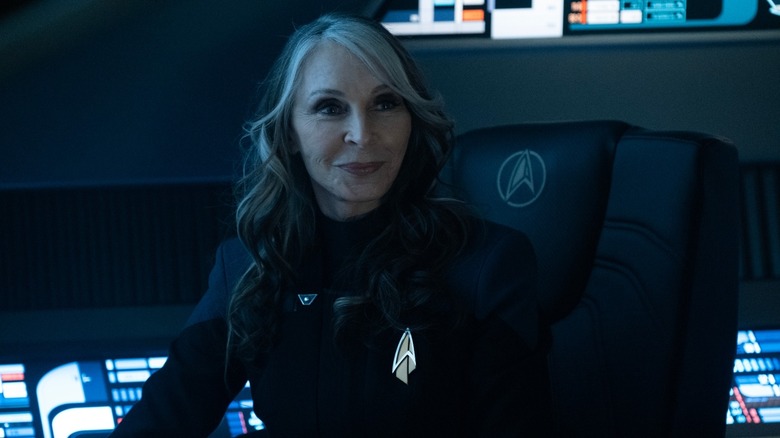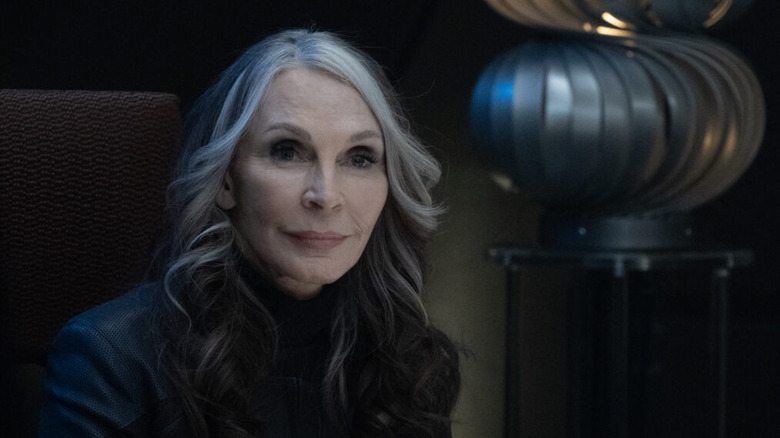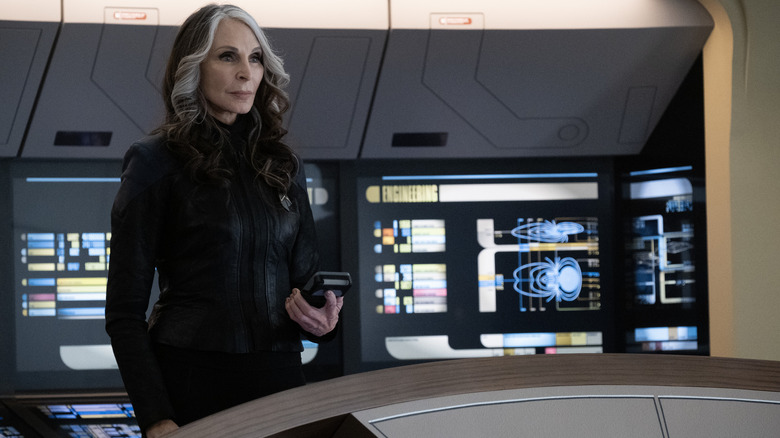Why Star Trek's Gates McFadden Struggled With Gene Roddenberry's Work
In many ways, "Star Trek" creator Gene Roddenberry was a very progressive thinker. His hit TV series depicted a future wherein humanity had outgrown concepts like prejudice, war, and greed, and it stood as an open criticism of Cold War politics, corporate malfeasance, and the damage the religious right was doing to the country. Roddenberry pictured a semi-idealized future without want, and posited that humans would eventually come to embrace intellect, diplomacy, open-mindedness, and a benevolent — not a warlike — relationship with technology.
When it came to sex and women, however, Roddenberry was perhaps a little less philosophically graceful. He famously had multiple affairs and long-term girlfriends while he was married, and oversaw multiple "Star Trek" episodes that were, more or less, sexual fantasies for him. He was a free love advocate, often speaking crassly about the importance of sex in his life. In the book "The Fifty-Year Mission: The Next 25 Years: From The Next Generation to J. J. Abrams" edited by Mark A. Altman and Edward Gross, writer Tracy Tormé recalls a shocking phone call he had with Roddenberry about what "pleasure" was. Basically, it was a rant about the importance of his own orgasms. Roddenberry's language was far more ... colorful.
Roddenberry's regressive sexual politics were, naturally, noticed by the cast of "Star Trek: The Next Generation," mainly by Gates McFadden, who played Dr. Beverly Crusher on the show. In a video interview with "Jake's Takes," McFadden noted that she would love to have asked Roddenberry about the way women were written on the latest season of "Star Trek: Picard," particularly how they would compare to Gene's views of them. McFadden loved Roddenberry's idealized future but felt he had a long way to go in his respect for female characters.
'The women are much stronger'
On "Star Trek: The Next Generation," especially in its early seasons, women were often relegated to motherly, caretaker roles. Shows of capability, strength, and guidance were, in contrast, more often handed to men. Initially, the Enterprise's security chief was a woman named Tasha Yar (Denise Crosby), but Crosby left the show during its first season and her character was notoriously killed. By 2023, and the third season of "Picard," McFadden felt that the women of the series had finally been allowed to take action — to fire weapons, to dispatch with the villains, to be the villains. McFadden said of the third season that:
"The women are much stronger. [...] [T]here's nothing that you would exclude them from. That wasn't true before. Obviously, I have enormous, endless respect for Gene's vision of the show and his idea and his concept of the future and the possibility of what it could be, but I actually struggled with some of the roles that women were in."
McFadden noted that after Gene's death, the roles for women in "Star Trek" were expanded to more command roles, and referred to the fact that Kate Mulgrew played the captain of a starship in "Star Trek: Voyager."
"But I absolutely love the way all of us are portrayed in this season, and I think that's one of the things I would say. 'You see, women can do that. [...] [W]e can have conflict like this and still work together, collaborate, and find a resolution. It might not be a perfect resolution — because the world is imperfect — but we are doing what's great for the greater good.'"
Perhaps too often, action addressing Trek's moral issues would fall to men. "Picard," McFadden felt, finally let women have an equal voice.
Where's mom?
McFadden also noted that Dr. Crusher was too often pushed off to the side when it came to her relationship with her son Wesley (Wil Wheaton). Wes had his own mother on the ship, but there were precious few scenes of the two characters interacting in a meaningful way. She felt that Roddenberry, having never been a mother, didn't seem to grasp the relationship a mom can have with her son. "[T]hat was part of where I had problems," she said, "because Gene didn't have that particular experience that I had being a mother." McFadden also said:
"And mothers. I mean, Gene ... I think some of the writers had a vision, because they weren't home seeing their kids, because they were always working so hard on the show, I found that there were always these ... Any time Wesley Crusher needed some advice it was always from one of the male characters.[...] I thought, what about these single parents, be [they] male or female? As a mother, I have had huge philosophical discussions with my son about all kinds of things. It's not just, 'Honey, do what I'm saying and here's your lunchbox.'"
Gene, while progressive, was still merely a horny straight dude who tended to see the future as being male-dominated, where men were able to get the sex they wanted whenever they wanted. He didn't really care about motherhood and wasn't always good about putting women in positions of authority. It seems that Roddenberry's successors took his ideas and pushed them into more progressive places.


